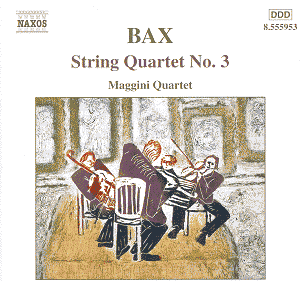The Magginis have already made a splash with their
Naxos recordings of the quartets by Moeran, Walton, RVW, Elgar and Bliss.
Last year Naxos issued their recordings of Bax's sunny Dvořákian
first quartet (a lyrical gem alive with whistleable melodies) and the
more densely luxuriant contrapuntal second quartet. After a round of
concert performances of Bax's Third Quartet the Magginis
went to Potton Hall again to complete the Bax trilogy. This is not the
work's first commercial recording although it is certainly its first
outing on CD. The first recording came out in 1979 on Lewis Foreman's
Gaudeamus label - the LP KRS 31 with the Allegri Quartet. That Gaudeamus
analogue tape never made it to CD and in the light of the Maggini's
excellence it seems unlikely we will hear that again except on the original
LP.
The work dates from Bax's 52nd year, 1936, when it
was written for and premiered by the Griller Quartet. It is floral and
perfumed (echoes of Peterson-Berger’s Frösöblömster
pieces) and almost Nordic in the first movement. It is haunted and tender
in the poco lento and desperate and hunted in the Scherzo
and Trio (a typical bipartite Bax construct of the nineteen-thirties).
I owe it to Lewis Foreman's erudite but highly readable liner note that
I can mention that Bax spent summers during the 1930s with Moeran at
Kenmare. Something of the Lonely Waters desolation that occasionally
seeps into Bax's pages can be found also in the middle movements of
Moeran's contemporaneous Symphony in G minor. The initially brusque
Allegro finale is determined and full of kinetic energy and at
00.54 quotes a typical RVW gesture. This is Bax's most symphonic and
ambitious quartet and while the effect is not completely convincing
it is an advance on the failed experiment of the Second Quartet. Equally
it misses the triumphant mastery of the Piano Quintet. The Lyrical
Interlude I last heard in 1972 in a broadcast in the 'England's
Green and Pleasant Land' series celebrating
the RVW centenary. The Interlude is once again rather like sunnily warm
Dvořák touched with the Erse wand. The slow movement of Bax's 1905
student quartet was orchestrated as his Yeatsian Cathaleen
tone poem already recorded in orchestral form on Chandos. The Magginis
manage a most magical triple piano at 10.30.
This is a disc indispensable to those in pursuit of
the Bax of the 1930s. Those looking for a complete masterpiece in the
Third Quartet will come away with something a little less but they will
have discovered a fascinating neglected work of Bax's high-tide of creativity.
The other two works are good to have but the reason to get this is the
Third Quartet. With this disc in place there seems no need for any further
competition; all the more so since the Magginis pace with their accustomed
fire and tenderness.
Rob Barnett
see also review by Ian Lace
The Arnold Bax website

